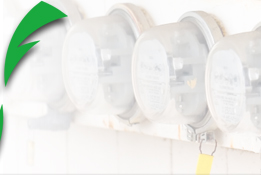 |
 |
 |
|
State board reconsiders deregulation San Diego Union Tribune —
May 25, 2007 Power supply for summer plentiful, utility officials say By a 4-1 vote, the California Public Utilities Commission established a proceeding that will first consider whether it has the legal authority to overturn the suspension of deregulation imposed by the Legislature in 2001. The legal issue is contentious, but PUC President Michael Peevey supported the measure. Critics said that because the Legislature halted deregulation in 2001, only the Legislature could restart the process. The PUC action came at the urging of large power consumers who believe they can get cheaper electricity from nonutility suppliers. Many of the same large users pushed California into its first round of deregulation in the late 1990s. Supporters of deregulation say the market has changed substantially since the meltdown of 2000-01, when electricity prices soared and supplies ran short. Large users like Qualcomm, Scripps Health, both California state university systems and national retailers argue that the state now has sufficient electricity supplies and enough market oversight to allow customers to safely choose suppliers other than local utilities. The PUC plan approved yesterday aims by the fall to clarify the legal issues around reinstating deregulation. Should it determine it can proceed, the PUC approved a schedule that could lead to a new deregulation plan by the winter of 2008-09. Peevey said that if Legislative action is required, the PUC's process will help “frame the debate” for lawmakers. Four legislative leaders, however, including Assembly Speaker Fabian Núñez, Senate President Pro Tem Don Perata, and Lloyd Levine and Christine Kehoe, who lead the Assembly and Senate energy committees, wrote Peevey this week asserting that the PUC doesn't have the authority to return the state to deregulation without legislative approval until 2015. The PUC action yesterday came in response to a formal petition from the Alliance for Retail Energy Markets, which represents large power companies, including a unit of Sempra Energy that sells electricity on the open market. Norman Plotkin, executive director of the alliance, said the time was right to allow customer choice for electricity because California has a surplus of power and because extensive hearings and regulatory proceedings had effectively dealt with those who manipulated the market during the crisis. “And none of my members were involved in that,” Plotkin said. Reminded that Sempra and others within the alliance paid millions to resolve allegations of market rigging, Plotkin said those were the parent companies of his coalition members. “We can't be held accountable for the actions of other companies even if they are affiliated,” Plotkin said. “I represent retail providers (not wholesale generators) and we have a firewall around us.” The Utility Reform Network, a Bay Area consumer group, said state law bars the PUC from reinstituting deregulation. What's more, it said, deregulation would be bad for most consumers. “The Legislature was clear in closing the door on deregulation,” said Matt Freedman, an attorney with the utility watchdog TURN. “The energy scoundrels should not be allowed to use the PUC to make an end run around the law.” Freedman added that deregulation has lead to higher rates wherever it's been implemented. The National Regulatory Research Institute said its studies have found that deregulation benefits a minority of electricity customers. “The only people who have done well under deregulation are the large industrial customers,” said Robert Burns, senior research specialist for the institute, the research arm of the national association of utility regulators. “All the other customers are about the same or worse off under deregulation.” Ken Rose, a consultant who provides an annual report on deregulation for the state of Virginia, noted that no state other than California is considering further deregulation. “Many of the states seeing large rate increases under deregulation are considering going back to regulation,” he said. California's Legislature suspended deregulation as the energy crisis roared early in 2001. The suspension came as power rates soared and electricity shortages caused brownouts. The plan had allowed electricity users to shop for the best price for electricity. It also forced utilities like San Diego Gas & Electric to sell off their power plants as a way to open the market to new suppliers. But supplies became short and although some large users got cheaper electricity for a time, smaller users could not find bargains. Prices soared, and local utilities found themselves unable to buy power, forcing the state of California to purchase electricity on their behalf through long-term contracts. All told, the attempt at deregulation cost ratepayers an estimated $40 billion in overcharges. Market manipulation by suppliers, including Enron and others, was identified as a major factor in causing the crisis. The legislative action ending deregulation allowed customers who were buying power from suppliers other than their local utilities to continue. But the Legislature banned any additional customers who were buying electricity from utilities from going to independent suppliers. About 10 percent of state power users continue to get their electricity from nonutility suppliers, an arrangement called direct access. In San Diego Gas & Electric's territory, about 15 percent of the electricity is being supplied by companies other than the utility. Critics of the PUC's vote yesterday contend that the law suspending deregulation requires that the suspension stand until the last of the California-signed power contracts expires in 2015. In comments filed with the PUC before yesterday's vote, SDG&E urged an end to the rate cap that was imposed at the same time deregulation was suspended in 2001. That cap has banned rate hikes for customers using minimal amounts of electricity. SDG&E said the cap sends the wrong price signals to low-usage customers. Jennifer Briscoe, a spokeswoman for SDG&E, said the utility supports the PUC's decision opening the process to reinstitute deregulation. In yesterday's PUC vote, Commissioners Rachelle Chong, Dian Grueneich and John Bohn, along with Peevey, voted “yes.” Timothy Simon cast the vote against the measure.
|
||||||||||
California Alliance for Competitive Energy Solutions — CACES
| © Copyright 2007-2023 California Alliance for Competitive Energy Solutions — CACES |
